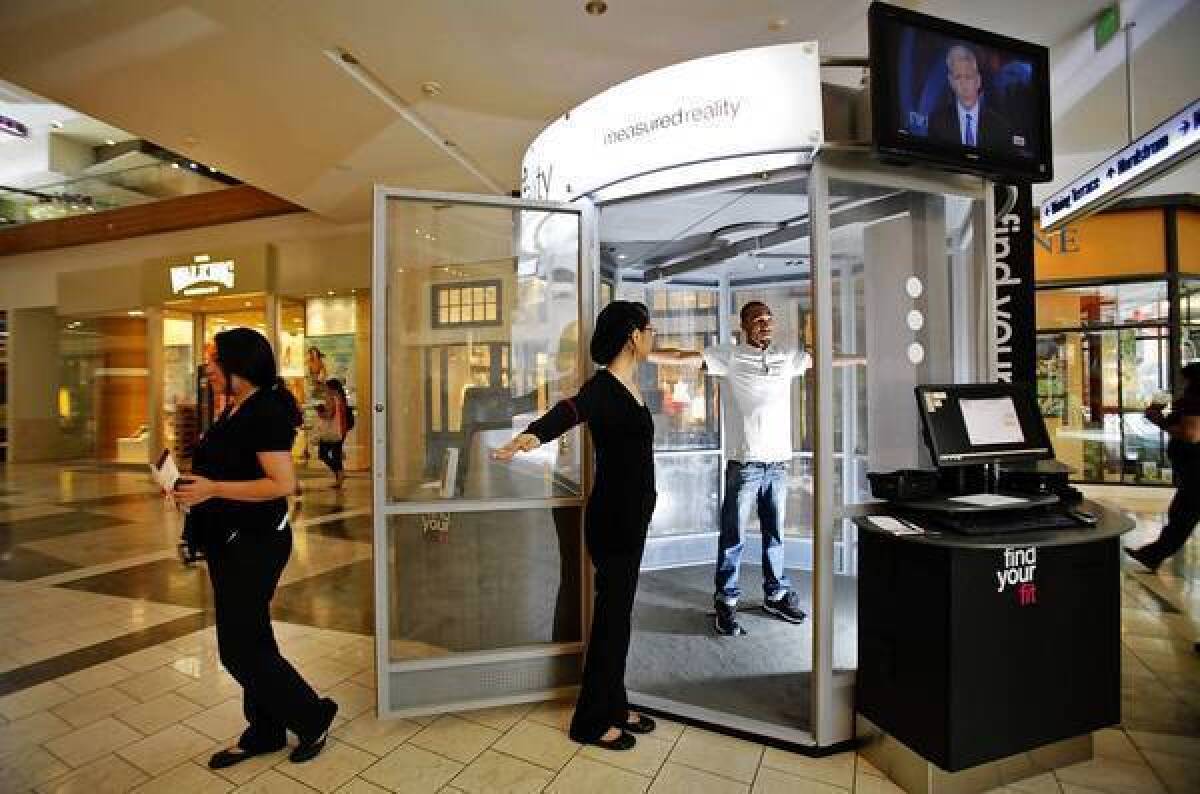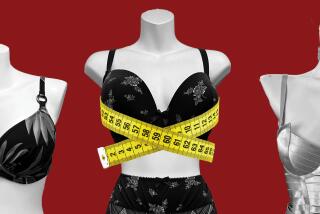Virtual fitting rooms changing the clothes shopping experience

At the Westfield Culver City mall, jeans shopper Stephanie Heredia stepped into a booth resembling an airport body scanner. In less than 20 seconds, she walked away with a printout that recommended a dozen denim styles to fit her hourglass-shaped frame.
Paper in hand, she headed to JCPenney to try on a pair of size 12 boot cut Levi’s. The fit was perfect. And the best part was no shimmying in and out of a stack of styles and sizes to get it.
“Whenever I go shopping for jeans, I have a heck of a time,” said Heredia, 50, a jewelry sales manager from Culver City. “This is something new, more exciting. My son even did it and he was impressed.”
New technology is making it easier than ever to find clothes that fit and flatter. Size-matching machines are springing up in shopping centers around the country, including seven malls in Southern California. Free to shoppers, the service means less dressing room drama for customers like Heredia — and the promise of bigger profits for the industry.
Clothing makers, armed with body data collected from real shoppers, could sew better-fitting garments and more accurately forecast what sizes to stock. Retailers would save on labor needed to fold and rehang rejected garments. Some are already seeing its potential as a marketing tool.
Denim purchases at Bloomingdale’s Century City store shot up in March during the test of a body scanner aimed at helping shoppers find the right pair of jeans, company spokeswoman Marissa Vitagliano said.
Sizing machines are “a great example of using technology to drive sales,” she said. “It’s certainly the wave of the future and we want to be part of that.”
The technology could also help eliminate one of the biggest drawbacks to Internet shopping: returns. More than 20% of apparel ordered online gets sent back. Sizing software being developed for home motion-sensing devices like the popular Microsoft Kinect will soon allow consumers to scan themselves in their living rooms before clicking “purchase” on their computer screens.
“It’s disruptive technology that could break open the whole e-commerce apparel space,” said Raj Sareen, chief executive and founder of Styku. The Los Angeles startup has developed a program that measures users’ dimensions and creates personalized on-screen avatars to digitally “try on” clothes. Using specifications provided by clothing manufacturers, the program can figure out whether that dress will fit like a tent or a tourniquet before a shopper ever takes it off the rack.
Sareen said the company plans to sell the tool directly to consumers for home use by the end of the year, but has not yet set a price. It is also in talks with major retailers to install the software inside store fitting rooms.
Technology companies say virtual fitting rooms and sizing machines turn the shopping experience into a science. In a typical setup, shoppers step fully clothed into a sizing machine and stand still with their arms outstretched. Thousands of points on the body are then measured and mapped — usually by a motion-sensing device or by a vertical wand containing small antennas — and used to determine a person’s unique shape. A shopper is then matched with specific styles of clothing brands to fit his or her body type based on sizing information gathered from retailers’ actual inventory.
In addition to Styku, players include London-based Bodymetrics, which makes store body-mapping booths, and the Calabasas firm FaceCake Marketing Technologies, which has developed a 3-D dressing room called Swivel that allows shoppers to virtually model clothes on a computer monitor or television screen.
Canadian firm Unique Solutions Design operates size-matching stations in 65 shopping malls across the U.S. that scan about 200,000 shoppers a month, according to company Chief Executive Tanya Shaw. Dubbed Me-Ality, the machines cost roughly $60,000 to $100,000 each to manufacture and install, said Shaw, who projects that 200 of the company’s machines will be installed nationwide by the end of the year.
In Southern California, Me-Ality scanners can be found in shopping centers in Arcadia, Canoga Park, Culver City, Thousand Oaks, West Covina, Santa Ana and Valencia. Mall officials see the machines as a way to differentiate their centers and draw more traffic.
“It’s great because it streamlines the shopping process and allows people to shop more efficiently and faster, and ultimately visit more stores,” said Sarah Richardson, director of marketing at Westfield Culver City. “Having that kind of tool takes the guesswork out of shopping.”
After the free scan, consumers are matched with their correct sizes in brands including Eddie Bauer, American Eagle Outfitters, Talbots and True Religion. They are given specific styles to buy and are provided with the price of each item.
Retail employees at Westfield Culver City say they have noticed a steady stream of shoppers coming into their stores clutching the white and hot pink printouts. Instead of browsing, the customers make a beeline for what’s recommended.
“They already know what kind of jeans they want; we don’t have to explain it to them,” said Moises Ramirez, a sales associate at Old Navy. He said the store had noticed an uptick in denim sales, particularly for its Rockstar style, since the Me-Ality sizing booth was set up in the mall.
The fit companies upload retailers’ merchandise measurements into their systems and either charge a small “per recommendation” fee each time that merchant’s product shows up in a user’s personalized results or take a cut of every purchase that results from one of their recommendations. Retailers can’t pay for their products to show up more often in results.
Technology companies also see potential profits in selling the body data they collect, which is a valuable trove of sizing information for retailers and manufacturers. Me-Ality’s Shaw and others said that only customers’ measurements, and not their names or other identifying data, would be shared.
Still, privacy experts worry about the potential for abuse. Frank M. Ahearn, an independent digital privacy expert in Los Angeles, said he thought hackers could obtain the data and publish it, or retailers could use it for targeted, invasive ads.
“The biggest problem with technology and privacy policies is the company has the right to change them,” Ahearn said.
There are other challenges. With retailers’ inventory changing rapidly, the tech firms have sometimes been late to update their clothing recommendations. Some shoppers have complained that the experience is gimmicky.
Keisha Brown tested Swivel during a trial at Bloomingdale’s in Santa Monica in May. She said the virtual clothing hovered awkwardly over her on-screen image.
“It made me feel fat because all the dresses were too thin for me,” said Brown, 35, a teacher from Santa Monica. “I didn’t get a realistic view of what the outfit would look like.”
Tech companies said they hope to expand the technology to other items where fit matters, such as scuba-diving suits, skiing gear, hats and sunglasses.
“There really is clothing out there to fit pretty much everybody, but as an industry we send the consumer on a wild goose chase to figure it out for themselves,” Me-Ality’s Shaw said. “If you step into the fitting room and every single thing you try on fits, then you’re going to be buying more.”
More to Read
Inside the business of entertainment
The Wide Shot brings you news, analysis and insights on everything from streaming wars to production — and what it all means for the future.
You may occasionally receive promotional content from the Los Angeles Times.










